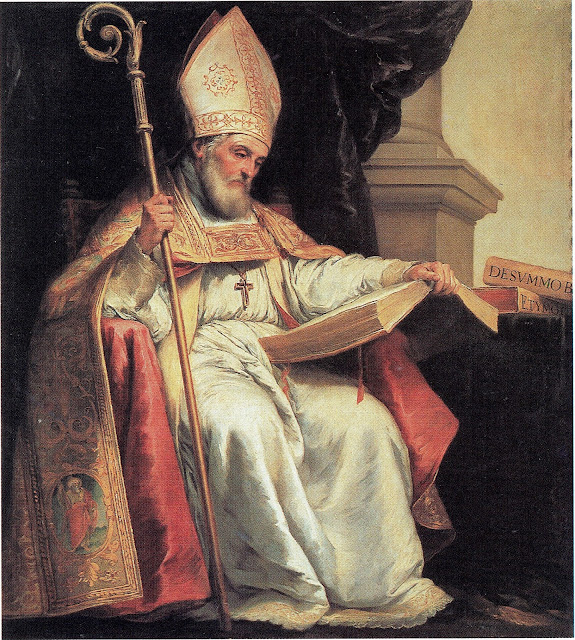Isidore of Seville (Latin: Isidorus Hispalensis; c. 560 – 4 April 636) was a Spanish scholar and cleric. He is widely regarded, in the words of 19th-century historian Montalembert, as "the last scholar of the ancient world".Isidore was the first Christian writer to try to compile a summa of universal knowledge, in his most important work, the Etymologiae... This encyclopedia—the first such Christian epitome—formed a huge compilation of 448 chapters in 20 volumes. He also invented the period (full stop), comma, and colon.In it, Isidore entered his own terse digest of Roman handbooks, miscellanies and compendia, he continued the trend towards abridgements and summaries that had characterised Roman learning in Late Antiquity. In the process, many fragments of classical learning are preserved that otherwise would have been hopelessly lost; "in fact, in the majority of his works, including the Origines, he contributes little more than the mortar which connects excerpts from other authors, as if he was aware of his deficiencies and had more confidence in the stilus maiorum than his own," his translator Katherine Nell MacFarlane remarks.Some of these fragments were lost in the first place because Isidore's work was so highly regarded—Braulio called it quaecunque fere sciri debentur, "practically everything that it is necessary to know"—that it superseded the use of many individual works of the classics themselves, which were not recopied and have therefore been lost: "all secular knowledge that was of use to the Christian scholar had been winnowed out and contained in one handy volume; the scholar need search no further".The fame of this work imparted a new impetus to encyclopedic writing, which bore abundant fruit in the subsequent centuries of the Middle Ages. It was the most popular compendium in medieval libraries. It was printed in at least ten editions between 1470 and 1530, showing Isidore's continued popularity in the Renaissance. Until the 12th century brought translations from Arabic sources, Isidore transmitted what western Europeans remembered of the works of Aristotle and other Greeks, although he understood only a limited amount of Greek. The Etymologiae was much copied, particularly into medieval bestiaries..
With that information in hand, we can now to finish the title. Because he tried to compile all the world's knowledge, he is the patron saint of the internet, computer users, computer technicians, programmers, students.

He looks a tad beleaguered...patron saint of just too many things
ReplyDeleteI was expecting the patron saint of the colon.
ReplyDeleteIndeed
ReplyDeleteSee also: Saint Thecla - who is, unofficially at least, in many Spanish-speaking countries the patron saint of computers and the internet due to the homophony with 'tecla' ("keyboard key"). The apocryphal Acts Of Paul and Thecla is a pretty wild ride. There are man-eating seals in it...
ReplyDeleteThe flip side of what you say here is that millions of students, in hundreds of specialties, have been taught what Isidore transmitted about their area; possibly ten percent of those in turn have been given some idea of who Isidore's sources were; but probably only one-tenth of one percent of those in turn were ever told what we read here about Isidore himself and why his writings have any interest or authority.
ReplyDelete